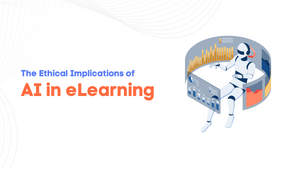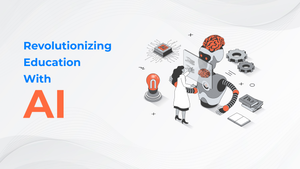With technology continuing to evolve at a rapid pace, there is no doubt that the future of learning management systems (LMS) is bright. As we stand on the brink of a new era, the fusion of cutting-edge technologies like Artificial Intelligence (AI) and Virtual Reality (VR) promises to revolutionize the way we approach learning and knowledge dissemination. In this blog, we shall learn the exciting possibilities that await the future of LMS, where AI, VR, and other innovations take center stage.
The Impact of AI and VR for Learners
The impact of AI and VR on the eLearning landscape is undeniable. As more educators welcome these technologies, the potential to revolutionize the way people learn is becoming increasingly clear.
AI can be used to create personalized learning experiences tailored to individual users' needs, while VR can help facilitate immersive learning environments.
- AI is already being utilized in adaptive educational systems that allow for the personalization of content based on learners' performance and progress.
This technology provides real-time feedback for learners to identify areas where they need more help and allows educators to monitor their progress quickly and easily. AI can also help improve knowledge retention by providing interactive simulations or games that engage learners in a fun yet meaningful way.
- VR has the potential to transform traditional classrooms into more immersive virtual ones by facilitating collaboration among peers from around the world through online video conferencing tools such as Zoom or Google Meetup.
With VR, instructors can demonstrate complex concepts with 3D visuals that bring them alive with virtual reality representations, creating an engaging environment for learners without them ever having to leave home!
While these technologies have huge potential when it comes to enabling learners to access huge amounts of content from anywhere in the world and creating engaging virtual classrooms, excessive use of technology could lead some learners astray from actual learning objectives if not managed carefully by educators themselves. Instructors must be mindful when integrating such technologies into their curriculums so as not to overwhelm their learners with too much content but still manage to provide an enriching experience at all times!
AI and VR in Online Learning
As the world of education continues to evolve, so does the technology used.
AI and VR are revolutionizing the way we learn, becoming increasingly common in online platforms. From personalizing learning experiences to providing immersive simulations, AI and VR offer a more engaging and interactive online learning experience for learners and educators alike.
- Using AI and VR, eLearners can personalize their experience by accessing tailored content based on their needs.
- Adaptive learning algorithms combined with machine learning deliver personalized content by analyzing learner data from multiple sources. This data also allows instructors to gain insights into lesson reception and address any issues.
- Incorporating virtual reality simulations engages learners with AI and VR technology.
- Virtual reality creates immersive experiences where learners can safely practice skills without real-life consequences.
- Educators can also test new ideas or concepts before implementing them without exposing learners to potential risks.
- AI-powered conversation systems like chatbots are increasingly popular on eLearning platforms.
- They offer 24/7 support without requiring constant human interaction, saving time and money.
AI and VR offer endless possibilities for online learning platforms. From personalized experiences through intelligent data collection and analysis to adaptive courses based on learner performance, these technologies have tremendous potential. Whether seeking a more engaging educational experience or a new delivery method for course material, consider harnessing the power of AI and VR in your next project.
The Future of Educators and LMS Platforms
AI can personalize learning experiences by creating tailored content that meets learners' needs. With AI-driven LMS platforms, educators can generate personalized content for each learner based on their preferences and interests. This fosters better engagement between educators and learners, leading to improved retention of material.
VR technology in education can create immersive learning experiences that simplify comprehension of complex concepts through 3D visualizations. VR also enables traditional classrooms to be brought into virtual settings, allowing for collaboration between remote learners and educators through interactive simulations or games. This injects more engagement and fun into the learning process.
AI-driven LMS platforms have the potential to revolutionize learning by providing enhanced security measures, including data privacy protocols and intuitive tracking systems. These systems facilitate better management of learner information while monitoring progress to ensure continued goal attainment. To ensure a successful future in education where learners are engaged with modern technologies like AI and VR-driven LMS platforms, educators must stay updated on technological advancements and incorporate them into their teaching methods.
LMS Platforms of the Future
As technology continues to reshape the educational landscape, BrainCert stands at the forefront, offering a glimpse into the possibilities that lie ahead. With its innovative Learning Management System (LMS) solutions, BrainCert empowers educators to harness the full potential of virtual classrooms, AI-driven personalized learning paths, and seamless integration of multimedia content. This dynamic platform not only streamlines teaching processes but also enhances learner engagement through interactive features and real-time collaboration tools. As we look to the horizon of education, BrainCert's visionary approach paves the way for educators to adapt, evolve, and thrive in a rapidly changing world.
To Summarize
The future of Learning Management Systems is a thrilling journey into uncharted territory. With AI, VR, and other emerging technologies, LMS will evolve into powerful tools that empower learners, facilitate collaboration, and unlock new dimensions of knowledge sharing. While the potential is boundless, responsible implementation, continuous innovation, and a commitment to inclusive education will be the guiding lights as we embark on this transformative path. Clutch onto the future of LMS, where AI, VR, and beyond converge to reshape the way we learn and grow.









